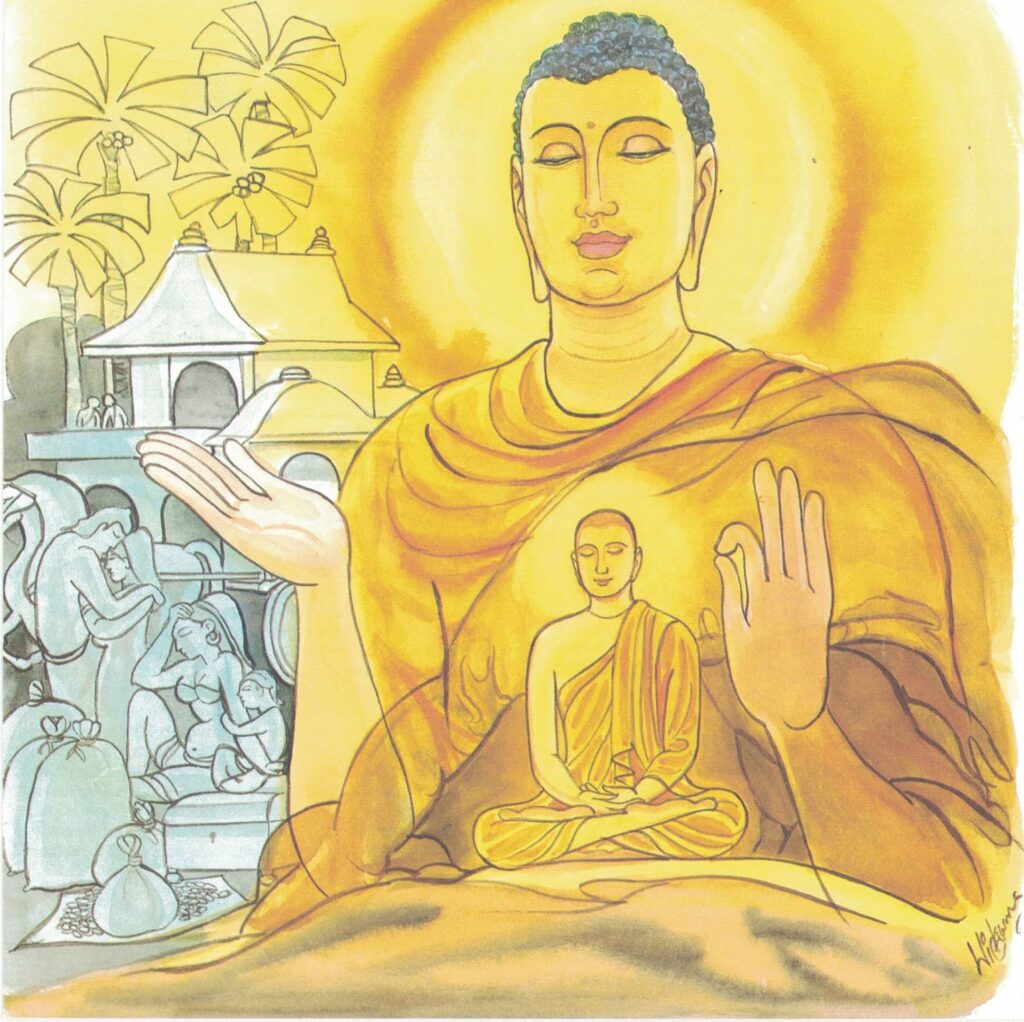Pali text, illustration and English translation of Dhammapada verse 397:
sabbasaṃyojanaṃ chetvā yo ve na paritassati |
saṅgātigaṃ vidaññuttaṃ tamahaṃ brūmi brāhmaṇaṃ || 397 ||
397. Who fetters all has severed does tremble not at all, who’s gone beyond all bonds, unyoked, that one I call a Brahmin True.

The Story of Uggasena the Acrobat
This story has been related in detail in the commentary on the stanza beginning with the words, “Give up the things of the past, give up the things of the future.”
For, at that time when the monks said to the Buddha, “Venerable, Uggasena says, ‘I have no fear;’ without a doubt he says that which is not true, utters falsehood,” the Buddha replied, “Monks, those who, like my son, have severed the attachments, have no fear.”
Explanatory Translation (Verse 397)
ye sabbasaññojanaṃ chetvā ve na paritassati
saṅgātigaṃ visaṃyuttaṃ taṃ ahaṃ brāhmaṇaṃ brūmi
ye: some one; sabbasaññojanaṃ [sabbasaññojana]: all the ten fetters; chetvā: having got rid of; ve: certainly; na paritassati: is free of trepidation; fearless; saṅgātigaṃ [saṅgātiga]: has gone beyond all forms of clinging; visaṃyuttaṃ [visaṃyutta]: free of blemishes; taṃ: him; ahaṃ: I; brāhmaṇaṃ [brāhmaṇa]: a brāhmin; brūmi: call
He has got rid of all fetters. In consequence, he is free of trepidation and is fearless. He has travelled beyond all bonds. Disengaged from bonds, he is no longer tied to the world. Such a person I describe as a brāhmaṇa.
Commentary and exegetical material (Verse ______)
sabba saññojanaṃ chetvā: Having got rid of all the ten fetters which are:
- personality-belief (sakkāya–diṭṭhi);
- skeptical doubt (vicikkichā);
- clinging to mere rules and ritual (silabbata–parāmāsa);
- sensuous craving (kāma–rāga);
- ill-will (vyāpāda);
- craving for fine-material existence (rūpa–rāga);
- craving for immaterial existence (arūpa–rāga);
- conceit (māna); (9) restlessness (uddhacca);
- ignorance (avijjā).
The first five of these are called ‘lower fetters’ (orambhāgīya–saṃyojana), as they tie to the sensuous world. The latter five are called ‘higher fetters’ (uddhambhāgīya–saṃyojana), as they tie to the higher worlds, i.e., the fine-material and immaterial world.
sangātigaṃ: The four forms of grasping, namely, lust, wrong view, clinging to precepts and rituals and holding a substantial first position (attavāda).
na paritassati: does not tremble; is not agitated. Agitation comes to those who are still mired in the worldly. Those who have gone beyond the worldly have not trepidation;they are fearless.